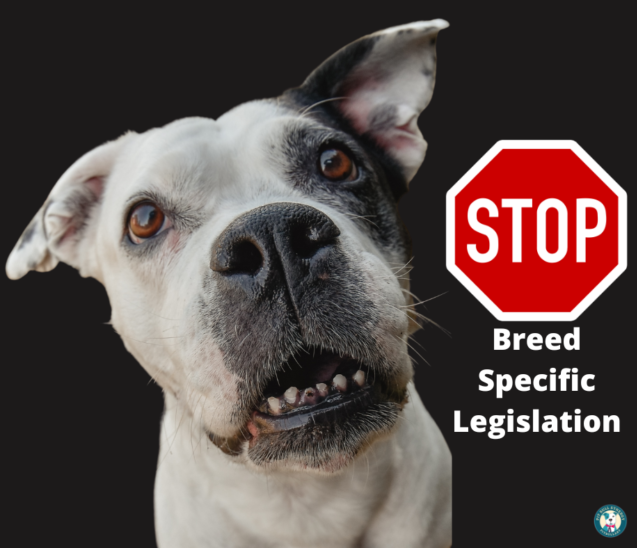menu
Breed Specific Legislation
Educate
Don't
Discriminate
Position on BSL – Pit Bull Synergy does not support any type of breed-specific legislation or (breed discrimination). We do support breed-neutral laws that hold dog owners accountable for the behaviors of their dogs.

What is BSL - Breed Specific Legislation?
Breed-specific legislation, also known as breed-discriminatory legislation (BDL), refers to laws that ban or restrict certain types of dogs based simply on their appearance because they are perceived as dangerous breeds. Breed-specific legislation focuses on dogs with a certain appearance or physical characteristics, instead of an actual breed. "Pit bulls" are the most frequent targets of breed-specific legislation despite being a general type of dog rather than a breed of dog. However, it is extremely difficult to determine a dog's breed or breed mix simply by looking at it.. It does not take into account how the owner has raised, trained, managed the dog or the dogs’ actual behaviors.
According to the U.S. Centers for Disease Control (CDC), more than 4.5 million people bitten in the United States by dogs each year, and more than 800,000 receive medical attention for dog bites, with at least half of them being children. It is no exaggeration to say that dog bites pose a significant health risk to our communities and society.
Any Dog Can Bite
Any dog can bite, regardless of its breed. It is the dog's individual history, behavior, general size, number of dogs involved, and the vulnerability of the person bitten that determines the likelihood of biting and whether a dog will cause a serious bite injury. Breed-specific bans are a simplistic answer to a far more complex socialproblem, and they have the potential to divert attention and resources from more effective approaches. breed-specific legislation focuses on dogs with a certain appearance or physical characteristics, instead of an actual breed. "Pit bulls" are the most frequent targets of breed-specific legislation despite being a general type rather than a breed. However, it is extremely difficult to determine a dog's breed or breed mix simply by looking at it.
What is Wrong with Breed Specific Legislation?
Determination of breed is difficult which makes breed specific laws expensive and difficult to enforce.
It is discriminatory against responsible owners and their dogs.
By generalizing the behaviors of dogs that look a certain way, innocent dogs and pet owners suffer. BSL causes hardship to responsible owners of
entirely friendly, properly supervised, and well-socialized dogs who happen to fall within the regulated breed. Although these dog owners
have done nothing to endanger the public, they are required to comply with local breed bans and regulations unless they are able to mount successful (and often costly) legal challenges. BSL can lead to the euthanasia of innocent dogs that fit a certain "look," and to responsible pet owners being forced to move or give up dogs that have never bitten or threatened to bite.
Requires identifying every dog as a particular breed
This has proven impossible to do accurately by simply looking at them, especially with mixed breed dogs.
Breed bans do not address the social issue of irresponsible pet ownership
Does nothing to make irresponsible dog owners accountable. Dogs are more likely to become aggressive when they are unsupervised, unneutered, and not socially conditioned to live closely with people or other dogs. In enacting breed-specific legislation, cities and states will spend money trying to enforce ineffective bans and restrictions rather than implementing proven solutions, such as licensing and leash laws, and responding proactively to owners of any dog that poses a risk to the community.
They may actually encourage ownership by irresponsible people
If you outlaw a breed, that breed then attracts outlaws. Unfortunately, some people take advantage of the "outlaw" status of their breed of choice to bolster their own self-image as living outside of the rules. The rise of pit bull ownership among gang members and others in the late 1980s coincided with the first round of breed-specific legislation.
Does not stop dog bites or improve public safety
The AVMA or American Veterinary Medical Association conducted an in-depth literature review to analyze existing studies on dog bites and
serious injuries. Their findings indicate that there is no single breed that stands out as the most dangerous. According to their review,
studies indicate breed is not a dependable marker or predictor of dangerous behavior in dogs. Better and more reliable indicators include
owner behavior, training, sex, neuter status, dog's location (urban vs. rural), and even varying ownership trends over the passing of time or geographic location. For example, they note that often reports of pit bull-type dogs in severe and fatal attacks. However, the reason is
likely not related to the breed. Instead, it is likely because they are kept in certain high-risk neighborhoods and likely owned by individuals who may use them for dog fights or have involvement in criminal or violent acts.

FEATURE
A Better Solution is Needed
Animal control and legislative approaches to protecting a community from basing dangerous dogs should not on breed, but instead on promoting responsible pet ownership and developing methods to rapidly identify and respond to owners whose dogs present an actual risk. Breed-specific
legislation not only fails to enhance public safety, but it's also expensive to enforce and violates the rights of dog parents. The best
public safety laws focus on the behavior of individual dogs and their individual people, not on how a dog looks.

